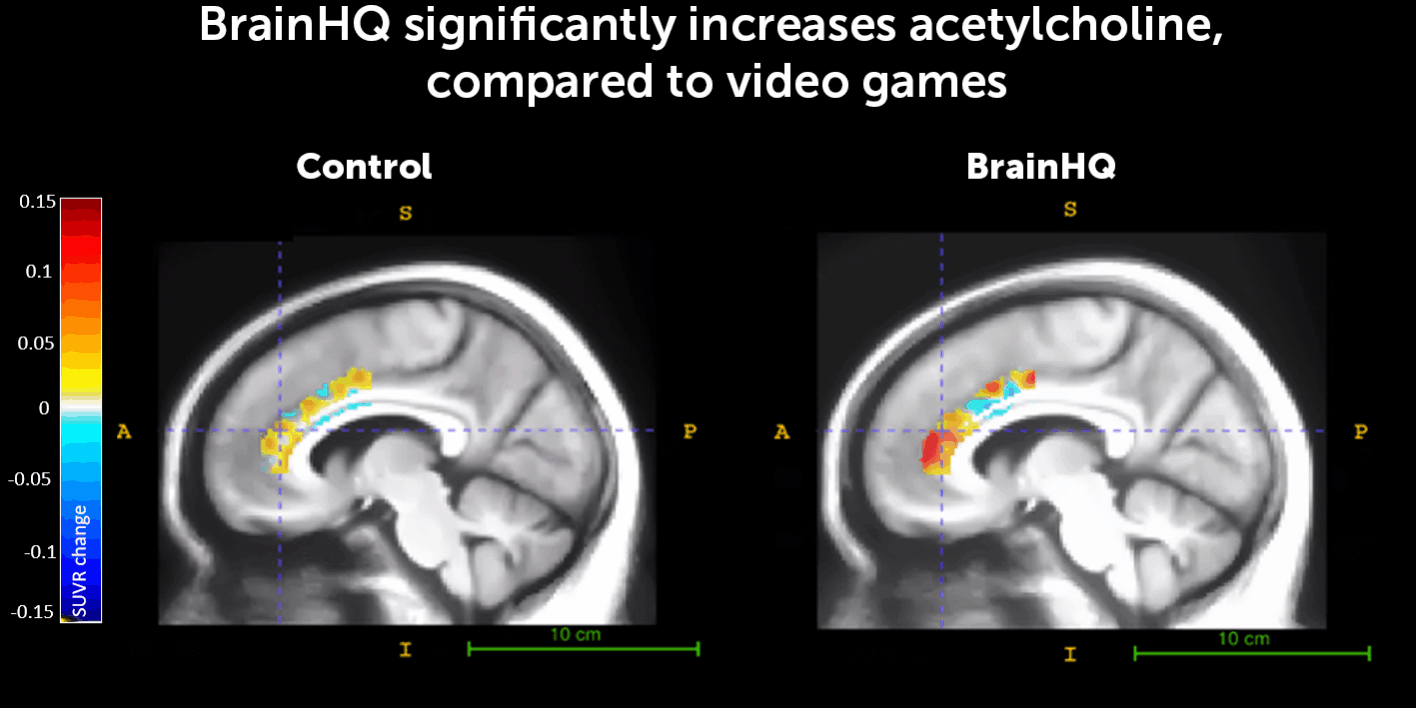10 weeks of BrainHQ exercises delivered a decade’s rejuvenation
Did you know that the brain makes chemicals that help you pay attention, learn, and remember–and that improve your mood and brain health?
One of the most important brain chemicals is called “acetylcholine.” Our brains produce more acetylcholine at the moment when we need to pay attention. It’s the brain’s way of saying “Hey, that’s important!”—and it helps our brains rewire. It’s a key component of brain plasticity—the ability of our brains to change.
Brain scientists have known for some time that, on average, people produce less and less of this “pay attention” chemical as they grow older. That decline in chemical production typically starts in our late 20’s and gets increasingly worse as the years go by.
That’s one of the reasons that–as we enter our 40s and 50s–it can be harder to respond and remember–especially if we were distracted. It’s why we start to say “huh?” a bit more often.
As we get into our 60s, 70s, and 80s, the brain’s chemical system gets increasingly sluggish. In people with pre-dementia and Alzheimer’s and related dementia, the production of the chemicals drops severely.
Many medical professionals thought that boosting the system that produces acetylcholine wasn’t possible. But for years, BrainHQ’s lead scientist, Dr. Michael Merzenich, has believed that BrainHQ exercises were designed to boost acetylcholine output. “One of the ways in which the brain is ‘plastic ’— that it can change — is in its production of chemicals that are important to brain health and cognition,” he says. “Many studies have shown that BrainHQ improves attention, which I believed was accompanied by an increase in acetylcholine release.”
Now, a new study — funded by the National Institutes of Health and conducted by independent Canadian researchers at McGill University — has shown that BrainHQ does just that. “The training restored cholinergic health to levels typically seen in someone 10 years younger,” said senior author Dr. Etienne de Villers-Sidani. “This is the first time any intervention, drug or non-drug, has been shown to do that in humans.”
Importantly, the study compared people who used the online BrainHQ exercises to people who used casual online games. Only the BrainHQ users showed the increase in acetylcholine, proving that the scientific design of BrainHQ is the “special sauce” that makes the difference.
“A lot of people assume crossword puzzles or reading are enough to keep the brain sharp. But not all activities truly promote neuroplasticity,” said de Villers-Sidani. “The program is already commercially available, making it an option for clinicians to discuss with patients interested in supporting brain health.”
Dr. Merzenich has been ahead of his time on some of the most important breakthroughs in modern neuroscience. His team invented the cochlear implant when most scientists thought it was impossible to restore hearing to people with deafness. He discovered lifelong brain plasticity when conventional scientific wisdom was that the brain couldn’t rewire itself after childhood. And decades ago, he predicted that brain-plasticity-based cognitive training could revivify brain chemical systems.
What can we learn from this study?
- Typically, the brain’s production of brain chemicals that assist with attention, learning, memory, and mood, decrease as we grow older — contributing to issues with attention, memory, decision-making and mood.
- For the first time, scientists have shown it’s possible to restore the production of such chemicals to the levels people had when they were younger. In this study, people who did BrainHQ for 30 minutes a day for 10 weeks saw an increase in production of acetylcholine (the “pay attention” chemical) to levels of a person about 10 years younger.
- What you do to stay mentally active matters. The group in the study who used brain exercises that required attending to progressively challenging tasks (and at increasingly shorter speeds) were significant and turned back the clock by nearly a decade. The other online games did not, even though those games demanded attention.
- Brain exercises that are increasingly challenging and faster are likely to have more impact on cognitive aging than activities that just require paying attention.
Read more about the study
This breakthrough news has gotten a lot of press attention. You can learn more by reading this deep dive into the results at CNN, NBC news, or by listening to this story on NPR (there’s also a transcript), or by watching this TV news story from Global News.







